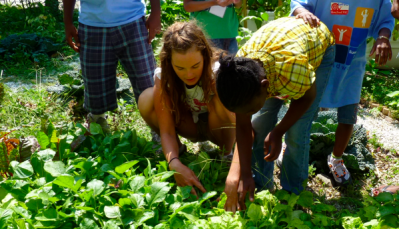Depending on where you live in the world, the concept of a young farmer might be old news to you, or it might be just plain bizarre. We dug up Nora to help spread the word that not only is farming - specifically, pulling weeds - some people's idea of the perfect 9-to-5er, but it can also be a career path as unique and vibrant as the person (young or old) who chooses it. She's also a timely reminder that farmers are entrepreneurs, too.
When did you know that you wanted to work in food?
I started working on a farm in Connecticut as a volunteer in July 2007. On the very first day I showed up at White Gate Farm in East Lyme, CT, we spent the day weeding the strawberries. I thought to myself, I could do this for hours and be happy. I was subsequently hired full time at the farm and went on to do just that - weed the strawberries/carrots/turnips, etc., for many hundreds of hours over the course of 4 years, and was perfectly happy doing so. But the real moment of joy for me was actually eating the fruits of my labor, and teaching myself how to cook in the process.
How did you get your current good food job?
I actually have several good food jobs right now. I work for Slow Food NYC as an urban farmer (found through a friend) and I make food at 61 Local- an awesome pub in Cobble Hill, Brooklyn with tons of local beer and food (found that one through goodfoodjobs.com!). But the main project that I am working on right now - the Student Farm Project- I made for myself! To make a long story short, I found a vacant lot owned by the city, got permission to use it, and started raising money to build a garden there for a nearby public school, PS 323. We plan to break ground on the garden in March, but are still trying to raise enough to make the garden a really spectacular place, which is why I started this Kickstarter campaign.
How did your previous work or life experience prepare you for a good food job?
Working at White Gate Farm has given me the growing skills to go along with the pervasive enthusiasm in the city for making green spaces. It seems easy to me. I am pretty much self taught, with some mentor-ship here and there, but the truth of it is, if you put a seed in the ground, it grows. Obviously there are other factors - sun, water, soil quality, seasons - but just having the confidence to actually put a seed in the ground is half the battle. Also, living alone on a farm for a few years - I didn't really have much else to do except cook elaborate meals for myself every night. I also wanted to be able to give our farm stand customers lots of cooking advice so I made sure I had a few recipes up my sleeve for everything we grew. As a result some of my favorite dishes involve "weird" things like celeriac or tomatillos.
What was the greatest obstacle you had to overcome in pursuing your Good Food Job dream?
I felt for a long time like I wasn't pursuing a serious career, wasn't making a good enough living, wouldn't ever be able to support myself or a family - I also had a bit of an inferiority complex around my doctor and lawyer peers. But, having cobbled together enough work to make a living wage; having total control over what I do, and building something from the ground up seem like the best things I could ask for in my life right now.
What can you identify as the greatest opportunities in food right now?
Seems like the biggest opportunities in food right now center around local food, local production and local economies. The trend toward sustainable, locally grown/made food does not just belong to the food-educated elite anymore. The food industry, like everything else, has gotten too big, and the high cost of importing food from other states and countries is turning people off. The high cost to your health of eating the cheapest, most subsidized foods (made essentially of corn and soy) is also becoming much more visible and turning people away from processed food. There is a great opportunity to act upon cost and health concerns here, while at the same time strengthening local economies and building community ties.
If you could be compensated for your work with something other than money, what would it be?
More land! More vacant lots! I actually think this could be a great initiative for the city. If a farmer, or any individual, can prove that they are capable of raising money, building and maintaining a public food garden, they should be rewarded with more plots of land, and in-kind donations of the basic materials needed to get it started. Green Thumb already donates lots of materials to registered community and school gardens, but the process, beginning with locating available lots, could be more streamlined and visible!









